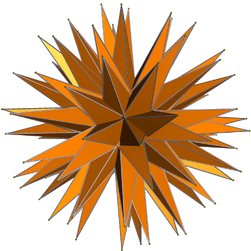Great pentagrammic hexecontahedron
| Great pentagrammic hexecontahedron | |
|---|---|

| |
| Type | Star polyhedron |
| Face | |
| Elements | F = 60, E = 150 V = 92 (χ = 2) |
| Symmetry group | I, [5,3]+, 532 |
| Index references | DU74 |
| dual polyhedron | Great retrosnub icosidodecahedron |
In geometry, the great pentagrammic hexecontahedron (or great dentoid ditriacontahedron) is a nonconvex isohedral polyhedron. It is the dual of the great retrosnub icosidodecahedron. Its 60 faces are irregular pentagrams.

Proportions
[edit]Denote the golden ratio by . Let be the largest positive zero of the polynomial . Then each pentagrammic face has four equal angles of and one angle of . Each face has three long and two short edges. The ratio between the lengths of the long and the short edges is given by
- .
The dihedral angle equals . Part of each face lies inside the solid, hence is invisible in solid models. The other two zeroes of the polynomial play a similar role in the description of the great pentagonal hexecontahedron and the great inverted pentagonal hexecontahedron.
References
[edit]- Wenninger, Magnus (1983), Dual Models, Cambridge University Press, ISBN 978-0-521-54325-5, MR 0730208









